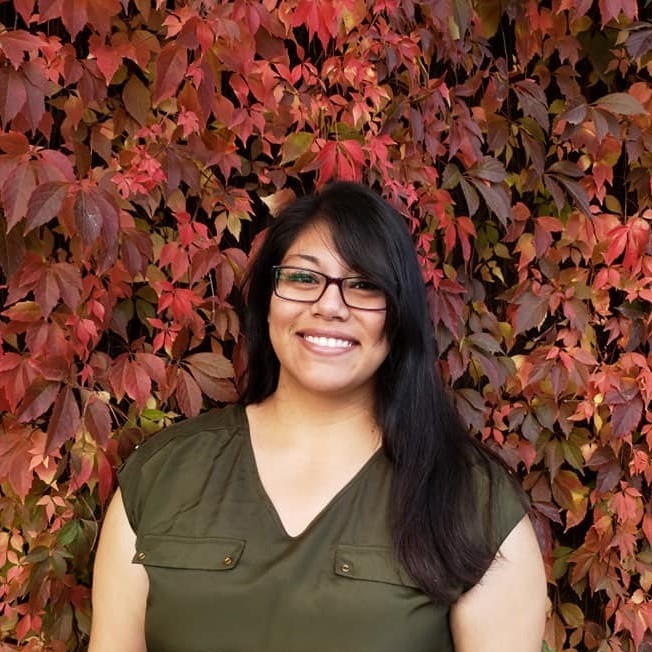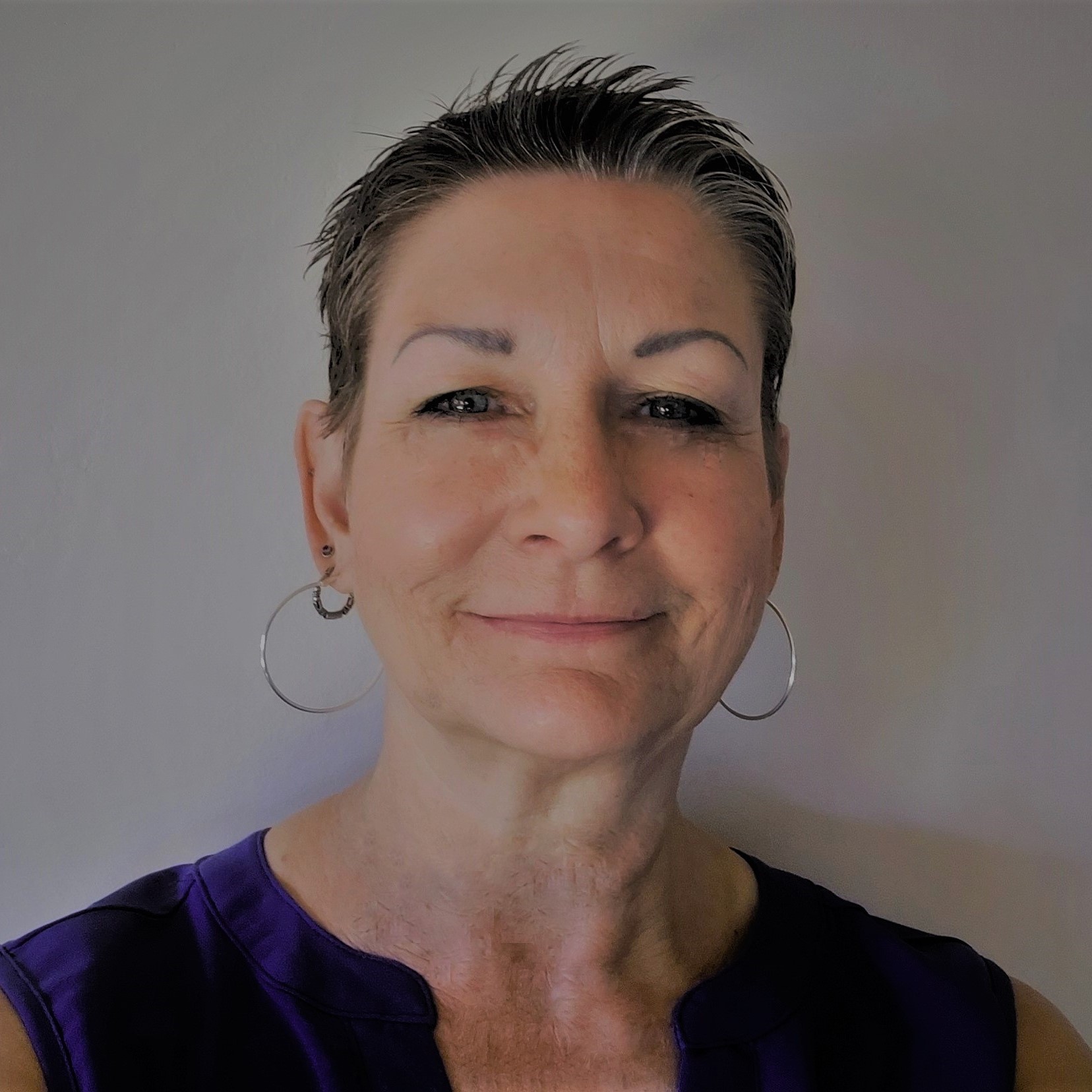First Gen Stories
At UNM you will be introduced to a number of opportunities and programs, but our strongest asset is the people you will meet. Share your own First-Gen Proud story by completing the form.
Below is a directory of faculty and staff who identify as First Gen Proud. Check out their stories by clicking on their name:
Anh Phan

Hometown:
Ho Chi Minh City, Vietnam
Title:Business Service Coordinator
Department:UNM Health Science Library and Informatics Center
Campus:UNM - North Campus
Degree(s):International Business
Institution:Arcada University of Applied Sciences
- First Gen Story
Like any other first-gen stories, neither of my parents attended college. However, they always encouraged me to do well in school and emphasized the importance of education. Thanks to that, I did really well in school and got accepted into a well-known university in Vietnam. However, I did not know how to decide on a major that would fit myself best. I ended up majoring in Marketing since it was the most popular field at the time. I was afraid to ask for help and being judged for not knowing what I was doing so I was attending school like any other students. After 2 years of studying Marketing, I finally realized that it was not what I wanted to do and I was not obtaining the knowledge and skills needed. I decided to ask for help from a school counselor to talk about my strengths, my passions, and for recommendations. Thanks to her, I got to know about the educational program in Finland which was at the time tuition free. It was always my dream to go abroad and experience different cultures and languages. With the encouragement of my parents. I decided to apply and took the exam. Luckily, I was accepted. Looking back, if I had not gotten over my fears and had not sought help, I might not have been where I am today.
- What advice would you give to fellow first-gen students?
There is always a first for everything. It is okay to feel nervous but please don't be afraid of what might happen. College is not a scary place, it is a place that you can meet new people, have interesting experience, and equip yourselves with powerful knowledge. You are not alone and there are numerous resources and people who would do their best to support and help you succeed. Use your "First Gen" status to your advantage and to make you stand out among the crowd.
Brittany
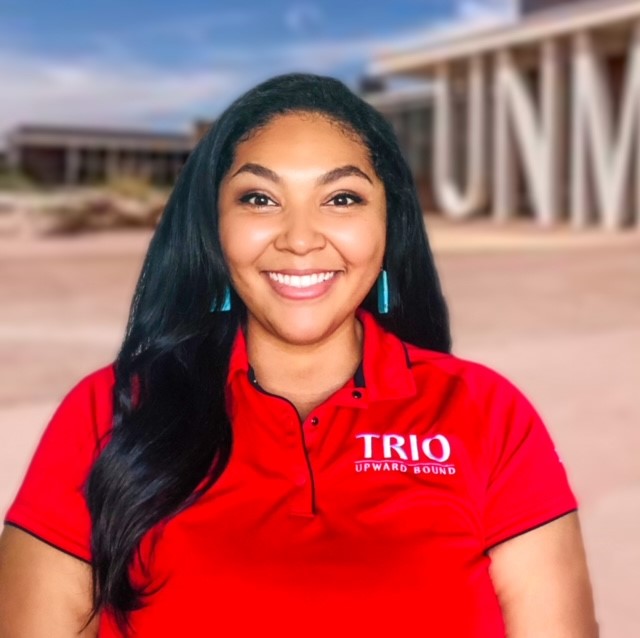
Hometown:
Window Rock
Title:Former Program Director
Department:Upward Bound TRIO
Campus:UNM - Gallup
Degree(s):Master's of Public Administration
Institution:University of New Mexico
- First Gen Story
As a child I was convinced that everyone had to go to college. I thought it was mandatory - the thing that everyone had to do when they grew up.Naively, I thought I would just know what to do when the time came. Fastforward to high school and I was ready to learn exactly what I needed to doto prepare for college. Cue the reality check. I attended a high schoollocated on the Navajo Nation that had little to zero resources regarding preparing for college. My counselors gave me the impression that collegeplanning started my senior year so I had plenty of time to focus on athletics and the day to day of high school. I can remember during my sophomoreyear of Honors English, my teacher told me the only way I would be able toattend an Ivy League school (a school worth going to) would be if I left myhigh school on the rez (near my family, culture, friends, everything), andattended a private high school on the east coast for high achieving minoritystudents. I was not ready or equipped to do this. I had no idea what else Icould do. During my senior year, I still had no clue what I should be doingto prepare for college. When I met with my counselor, I had no idea what questions to ask or resources I needed. She wasn't too helpful either. Shewould give me applications to local community colleges and universities butI had no idea about all the admission fees I would need to pay or the optionto request fee waivers. I knew my parents would not be able to pay for allthose fees so I limited my college pool. I struggled with finding scholarshipsthat were legitimate and I worried I wouldn't be able to pay for college eventhough I had a high GPA. I was a first generation to college student, I hadno idea. All I knew was that I needed to go to college, and I was trying mybest to navigate the "college-going process" with help from friends and mymom. I applied to Northern Arizona University and I was accepted. I declared amajor in Journalism and Communication (wasn't too sure if that was theright major for me, but oh well). While on campus, I was connected with theNative American Student Services and they were my SAVING GRACE.They helped me navigate through my first year of college and provided somany resources and answered all my questions. Although I still struggledwith truly understanding the college-going experience, I was able to persist.There are many things I still wish I knew or did at that time, but I am happythat I was able to graduate with my B.S. degree in four years with minimaldebt and professional experience through student employment. My first genexperience still continued onto grad school, professional employment,homeownership, financial literacy, etc. I understand this is a lifelong thing,but my past experiences as a first gen student has helped me build myresiliency and skill set. I now work as a TRIO professional and I am aDirector of a college readiness program (TRIO Upward Bound) for first genand low-income high school students near my community because of myown experience growing up. I have come full circle. #FirstGenProud.
- What advice would you give to fellow first-gen students?
I encourage all first-gen students in high school to start their college prepduring their 9th grade year. We now live in a time where Google is apowerful tool. Simply typing in "How can I prepare for college while in highschool?" If you are able to connect with a college readiness program likeTRIO Upward Bound or Gear Up, do so. If you don't have access to thoseprograms locally, search for summer college prep programs you can attendlike College Horizons. Finding a mentor (teacher, coach, alumni, familymember, etc.) who has attended college or is currently working is a goodidea to gain some insight on what processes you need to take. I alsorecommend starting a saving account to cover college expenses likeadmission fees, campus visit expenses, on-campus housing deposits,textbooks, etc. I encourage first gen students currently in college to get connected tostudent support programs and organizations on campus. If your college oruniversity has a TRIO Student Support Services, APPLY! TRIO programsare designed to help first-gen students succeed while in college. Meet withyour academic advisor regularly to gain a better understanding of yourcourses and graduation plan. Connect with your department to see whatopportunities they offer to their students such as internships as well asscholarship opportunities. Network with other students, university staff and faculty to expose yourself to more opportunities. If you are having troublecommunicating and connecting with family now that you are in college andthey may not know the demands of your new experience, utilize the studentcounseling center for strategies to better express yourself. Don't give up!The bigger picture of you receiving your degree and being better qualifiedfor your career choice will be worth it.
Cynthia
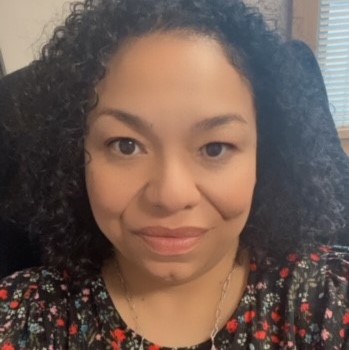
Hometown:
Brooklyn, NY
Title:Department:
Veterans Upward Bound
Campus:UNM - Taos
Degree(s):Bachelor of Arts
Institution:Eastern New Mexico University
- First Gen Story
I am the first generation of my family born in the United States. My parentsmoved here from Tegucigalpa, Honduras in 1972. My parents moved toNew York City in the hopes of providing a sustainable future to theirchildren. I am the last of 4 children. My parents put a strong emphasis oneducation. They supported me every step of the way. I had somedifficulties but never gave up. My parents never gave up on me. At theage of 42, I received my degree. I am now in Graduate School.Last year we celebrated the very first member of our family who wentstraight to college after high school and completed his MBA. MY nephew. My parents have seen the efforts of their sacrifice and hard work pay off.
- What advice would you give to fellow first-gen students?
Don't ever give up. YOU can make whatever you want of your life. Youreducational goals are within your reach. Don't ever stop working towardthose goals.
Deyanira

Hometown:
Albuquerque, NM
Title:Program Specialist
Department:Project ECHO
Campus:UNM - Main Campus
Degree(s):Master of Arts
Institution:University of New Mexico
- First Gen Story
I am the proud daughter of immigrants. My parents immigrated to the U.S.,like many have, in search for a better life. My dad, having only completedthe 2nd grade, dropped out to work in the fields and help his dad providefor their family. My mom completed the 6th grade before helping herwidowed mother to care for her own family. Despite these hardships, bothinstilled the importance of education and hard work in my brother and I. Iwas born and raised in Albuquerque, specifically the South Valley in theLos Padillas neighborhood. I attended Rio Grande High School andgraduated in 2011. I decided college was my next step, though I didn'tknow how to proceed or what field I would study. All I knew was followingthe advice of my peers and counselor at that time, for which I wasextremely grateful. When I started at UNM in the Fall of 2011, I thought Ihad an idea of what my degree was going to be, but I didn't. I was unsureand changed my major a lot for a couple of years. I didn't give up and bytaking advantage of the opportunities and resources along with theinvaluable support of SSS - TRIO, CEP, among many other UNMdepartments, I found my calling in Higher Education. Overall, the networkof support I developed helped me get to where I am now. My experiencesat UNM, the good and the not so good, helped me become the person thatI am today. From studying abroad in Scotland to representing UNM at aleadership institute, I found that college is what you make of it with theopportunities you participate in, the hard work you do, and the obstaclesyou overcome. I graduated from UNM with my Bachelor's degree inSpanish in 2016, and now I work in a career I enjoy where I can give backand guide/help future Lobos.
- What advice would you give to fellow first-gen students?
1.) Take advantage of the opportunities at UNM, whether it be a student organization, an internship, or conference. The one thing I regret is nottaking advantage of these opportunities because I thought and believe itwasn't for me or because I wasn't good enough for the opportunity. Go for itand don't sell yourself short!2.) The resources at UNM are for YOU - so seek them out, even if it's justto answer a question you have in mind.3.) Don't give up - you belong!
Ivan
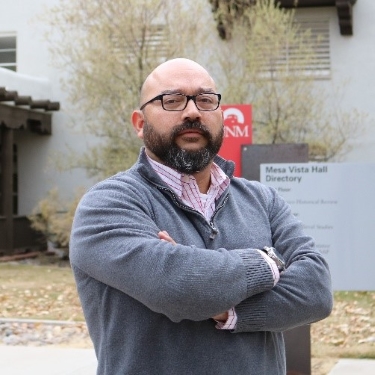
Hometown:
Title:
Department:
Campus:
UNM - Main Campus
Degree(s):Institution:
- First Gen Story
When I graduated from high school, I really didn't know what I was doing. I applied to UNM because my friends were doing it. I really didn't take the ACT seriously or any other preparations. My parents didn't know anything, even though my two older siblings had attended UNM. They had graduated and started their own lives. A few of the first-gen challenges I experienced were not knowing what to expect, not having someone guide you as you transition to college. All I knew was that everyone told me to go to college. I, unfortunately, spent fours year at UNM without really knowing what was going on. I didn't know there was financial aid! All those years, I was working and getting money from my parents to pay for tuition. In those first four years, I didn't connect to anyone or any organizations, which only added to my confusion about what I was doing with my life. I, of course, put on a façade that I knew exactly what was going on. There were semesters where I didn't even go full-time. Luckily in 1999, I was recruited to start a fraternity, Omega Delta Phi, and I took the leap of faith that changed my college experience. I was fortunate that I made a connection that showed so many things that I could be a part of. It created a network for me that I was never a part of. It led me to become a risk-taker. If it wasn't for my fraternity, I don't think I would be where I am today and have the people I have in my life. . Through my new network I was introduced to all the resources available to students, especially first-gen students. I was so astonished that FAFSA existed and it was "free" money. Like many other students out there, I took all the available loans and treated myself to a Las Vegas vacation but I learned not to take loans out if you didn't need them. As new generations of first-generation students transition to college life, connecting with someone or a group with knowledge of this new stage in a student's life is key. What I appreciated the most about connecting was learning about the world, new concepts, and myself. Students can succeed with not being part of some things, they can research resources and persevere through this journey in a bubble, but it's challenging without a connection, and of course its less fun.
- What advice would you give to fellow first-gen students?
Kelly
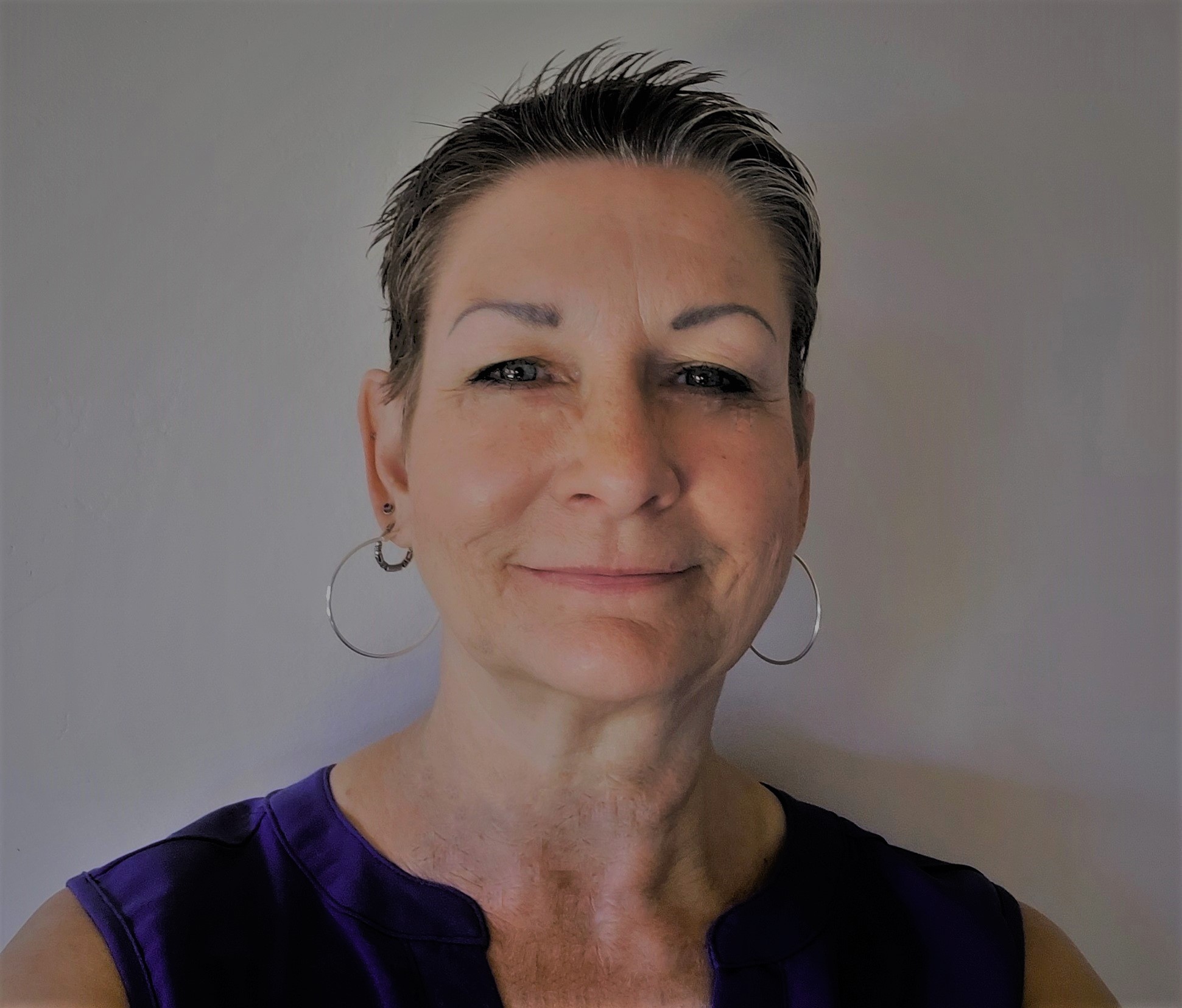
Hometown:
Denver, CO
Title:Program Coordinator
Department:Veterans Upward Bound
Campus:UNM - Taos
Degree(s):Bachelor of Science in Environmental Science
Institution:Metropolitan State University of Denver
- First Gen Story
I graduated from high school six months before the rest of my class and subsequently enlisted in the U.S. Army right after my 18th birthday. When I left the service, I traveled for several years as a dependent to my husband who was also in the Army. We eventually divorced and I found myself a single mother. I spent a lot of time just working to make ends meet; slowly working my way up the corporate ladder just to support myself and my daughter. Twenty years after leaving high school, I realized I wanted something more than just a job and went back to college. It took me eight years to obtain my Bachelor degree but I'd do it all again. My mother had never attended college and my father had taken a few college courses but neither had a degree. As the first in my family to complete a Bachelor degree, I have served as a role model for both of my younger sisters who hold degrees, as well as my daughter who will be graduating with a Master degree in August of this year. It was tough at times, especially at one point when I was working full-time and going to school full-time...but I'd do it all again.
- What advice would you give to fellow first-gen students?
Don't let anyone (even yourself) talk you out of going back to school! It won't be easy. If it were easy, everyone would do it. There will be challenging times and times when you ask yourself, "What the hell did I get myself into?" or maybe "Why did I think I could even do this?" Take one day at a time, take time off when you can (like summer breaks) and take advantage of any and all TRiO or other programs for which you are eligible. The university where I went didn't offer a Veterans Upward Bound program to help me with the transition from the military and the workplace to an academic environment, but if they had...I'd have enrolled in a heart beat.Good luck!
Laura
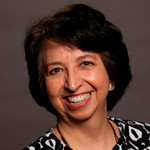
Hometown:
Coyote, NM
Title:Former Director
Department:Office of Advising Strategies
Campus:UNM - Main Campus
Degree(s):Communication
Institution:University of New Mexico
- First Gen Story
Growing up in rural New Mexico, with limited job prospects, I knew that Ineeded to leave to either work at a store or attend college. I had 2 oldersisters and 2 older brothers that had graduated from college so the idea ofgoing to college was familiar and it seemed like a better option thanworking at a store. I was able to get a full financial aid award plus Iattended a two-week summer bridge program that helped me get started. Ihad zero study skills so my first grades of C's and D's were a rudeawakening, but failing or quitting was not an option for me, so I startedspending more time reading, reviewing notes, regularly seeing tutors. Overall, I enjoyed college 100% more than high school because I wasaround people that wanted to learn. I had great professors that opened mymind to new things.
- What advice would you give to fellow first-gen students?
My top advice is to use all the resources to improving your grades,including study sessions with classmates, tutoring, CAPS workshops, etc. Next, I worked on-campus as a workstudy student until I graduated andloved having the flexibility of studying at work, I regret not taking aninternship or a workstudy job related to my major during my senior yearbecause it took me several months to get my first job offer after graduation.
Sarah
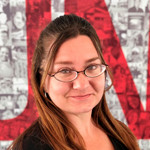
Hometown:
Albuquerque, NM
Title:Academic Advisement Specialist
Department:Office of Advising Strategies
Campus:UNM - Main Campus
Degree(s):Bachelors of History, Bachelor's of Religious Studies
Institution:University of New Mexico
- First Gen Story
Going to college was always something I aspired to, but it was also utterly mystifying. I lived in both rural and urban areas, neither providing me with a strong academic focus. In my eyes, the people who attended college were lawyers, healthcare practitioners, teachers, or do "things" with numbers. Meanwhile, I didn't even understand how financial aid worked and if I could apply for it. Deep in my heart, I couldn't shake the feeling that college was something for other people. People who were wealthier than me, more intelligent than me, more talented than me...those were the people who belonged in college. When I began at UNM, I was excited and terrified. I had classes I loved and thrived in. I had classes that made me believe I could never earn a degree (I probably dropped Intro to Statistics enough to teach the first three weeks myself). I had semesters I almost quit school, and semesters I changed my major because I believed I wasn't smart enough for my chosen one. But, I also had semesters where I had conversations with professors who changed how I looked at the world forever and made me a better person. I made mistakes. I grew from them. And I found others students, staff, and faculty familiar with my journey and gave it a name: First-Generation Students. I eventually earned my Bachelor's degree and then began graduate school. But even then, I didn't believe in myself. I followed familiar habits: Apply to new programs because I didn't think I was smart enough for the one that had accepted me; Drop classes because I was afraid that instructors could see I wasn't smart enough. But while working at UNM as an academic advisor, I saw in my undergraduates the same journey that I struggled with. And while I had intellectualized being 1st Gen, I had never taken to heart what it meant for my own story. I couldn't tell students they could succeed if I didn't believe I could. I had to be honest with my students and with myself. Things didn't change overnight, but my confidence grew. I applied to UNM's Masters in Public Administration and stayed. I stopped dropping classes...well, mostly. And when I got an A in a graduate-level statistics course, I started to believe in myself for the first time. In the Fall of 2021, I hope to graduate and continue my 1st Gen journey. I know there is so much more in his world for me to learn, and I'm grateful for the opportunity to pursue it.
- What advice would you give to fellow first-gen students?
You belong here. Stop for a second and ask yourself if you believe this. Because while your brain may tell you it is true, your heart might need more convincing. So let me tell you again. You belong here. Say it with me this time. I belong here. My gender, race, ethnicity, sexuality, birthplace, family, age, grades, finances, religion, politics, hopes, mistakes, and all. Whatever brought you to us, or made it harder to arrive, doesn't change this fact. You belong here. You might be excited and know what you want out of your time at UNM. Or it might all seem a hazy and scary choice you made because it seemed right, but you don't know why. Both pathways are valid. And both can lead to fulfilling dreams you have and dreams you don't even know of yet. You belong here. I hope you know that. But if you don't yet, that's okay too. So many people here have been in your shoes and now are here to believe in you enough that you have no choice but to believe in yourself too! And when you need us, I hope you utilize the resources here to help you (even though I know it can be scary doing so). But you should. Why? Because you belong here, my fellow Lobo. Welcome home.
Tamara
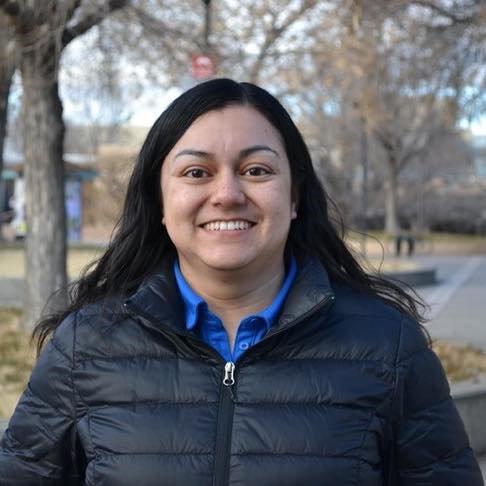
Hometown:
Chimayo, NM
Title:Supervisor, Student Success
Department:Student Support Services-TRIO
Campus:UNM - Valencia Campus
Degree(s):Bachelor of Arts in English and Spanish, Master's of Arts in English
Institution:University of New Mexico
- First Gen Story
This is my First Gen Story: I was terrified when I started at UNM. I didn'treally know anyone, and I didn't know what life in Albuquerque would looklike for me. My hometown, Chimayo, NM, still doesn't even have a gasstation, so everything about UNM and Albuquerque seemed so big. I feltlike I was the only one who didn't know what was happening and I didn'thave a family member I could ask for help. I remember sitting in my firstclass thinking, "I don't belong here!" Fortunately for me, my instructor entered the classroom before I couldleave. I didn't want to be rude, so I figured I would stay for the day. Myinstructor introduced herself and stated that she was a first-generationstudent too. She told us it was okay to ask questions and that she wouldhelp however she could. I didn't feel so out of place after that. I felt lessalone knowing that she had been in my position when she started collegeand she was able to succeed. I was also lucky to get accepted to UNM's Student Support Services-TRIOProgram (SSS). SSS is a program for first-generation, low-income, and/orstudents with a documented disability. SSS provided a space where I feltsafe asking questions that my family couldn't help me answer andconnected me with other resources to help me stay in school and finish mydegree. I was able to find people who felt just as lost as I did, and weworked to help each other. It took me awhile to feel comfortable askingquestions but completing my degree didn't feel so impossible once I did.Ultimately, I earned my Bachelor's degree in English and Spanish as well as my Master's degree in English Literature. Now I am so lucky to work in a place that allows me to help other first-generation students earn their degrees!
- What advice would you give to fellow first-gen students?
Asking for help takes strength and courage. There are plenty of people atUNM who want to assist you, so please ask for help when you need it sowe can connect you to the appropriate resources.
Lewis
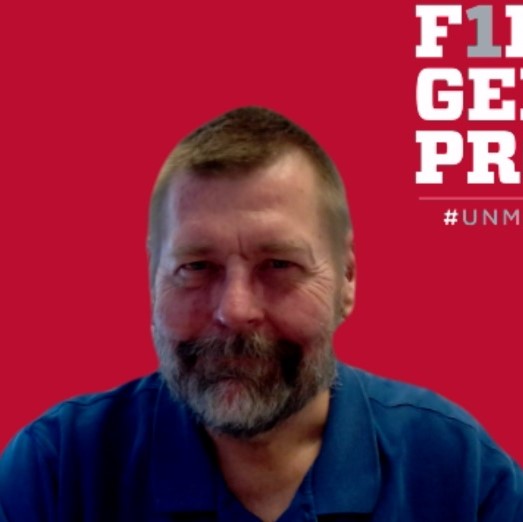
Hometown:
Gallup, New Mexico
Title:Director of Education and Associate Professor
Campus:UNM - Gallup
- Degree(s)
Ph.D
- Institution:
University of South Carolina
- First Gen Story
In 1981, I was a high school senior in Wilmington, NC. At that time, I was very much into instrumental music and had been awarded a music scholarship to attend Western Carolina University. One day, while I was in the band room, a fellow bandmate made a comment that changed my life. Theresa asked me what I was doing and I told her I was completing my college application. She looked at me, smiled, and said “I don’t know why you are doing that. All you’re going to do is go up there, flunk out, and waste your parents’ money.” After the shock of her comment subsided, I remembered that Theresa was the president of the National Honor Society and taking college classes while still in high school. I was convinced that if anyone would know how I would perform in college, she would. As a result, I turned down the scholarship and took a job as a bagger at a local grocery store right after graduation. Ultimately, I worked at that store for nine years. As I moved “up the ranks” into store management, I was responsible for hiring and training cashiers. Many of the cashiers I hired were college students working their way through school. I gradually began to realize that if they were capable of being successful in college, then I could be as well. I applied for admission at the University of North Carolina at Wilmington (UNCW). However, my college entrance scores from high school were so low that I was denied admission. At that time, the university had an “Unclassified Student” program. Essentially, I could wait until I was 23 and enroll to take five classes. If the classes were successfully completed, then I could enroll as a “regular” student. I enrolled as an Unclassified Student to prove my college worthiness. I graduated from UNCW with a bachelor’s degree in 1990, quit the grocery store, and began teaching second grade. Five years later, in 1995, I graduated with my Master of Education (M.Ed.) degree. In 1997, I was hired by UNCW to teach in the Watson School of Education. It was during that time that I returned to school to further my education. In 2001 I graduated from the University of South Carolina with a doctoral degree and became Dr. Lewis Gambill. After teaching in higher education for several years, I became a student again in 2015 and enrolled in a graduate program at New Mexico State University. In 2016, I graduated with a Master of Arts (M.A.) degree in Educational Administration. Not too bad for being the first person in my family to go to college!
- What advice would you give to fellow first-gen students?
My advice for a first generation college student is to always remember that obstacles are often temporary; dreams last forever. Don't let obstacles overshadow your dreams.
Dawn
Hometown:
Cochiti Pueblo, NM
Title:Program Manager
Department:Student Support Services-TRIO
- Campus:
Albuquerque - Main
- Degree(s):
Master's of Public Administration
- Institution:
University of New Mexico
- First Gen Story
I am a first-generation student since neither of my parents earned a bachelor’s degree. Yes, my parents offered me encouragement, but they could not help me navigate the in’s-and-outs of the college system like selecting courses, or filing for financial aid. As an Indigenous college student back then, I felt I was a minority among minorities. I remember coming to campus for classes then leaving not speaking to a single soul. Not sure how to survive college, I was in an emotional place where this feeling manifested itself as loneliness making me wonder if I belonged in college. I felt like an imposter. Raised on the Cochiti Pueblo reservation, I grew up with a strong family foundation in a setting where the community raises you with plenty of cousins, aunts, uncles and grandma’s, and grandpa’s who are around all the time. That foundation helped me but there were many times, where I faced both surmounting academic and personal roadblocks. Turning to my mom, she would encourage me to go see Pam Agoyo, then a college student, “her mom is so nice.” “Go talk to Loretta Clark,” then staff in Native American Studies, “She’s from Cochiti too.” “You should see Lucille Stilwell,” then AISS Director, “I’m sure she’ll remember you (from my 9th-grade summer program).” Slowly, pushing myself beyond the comforts of my safety bubble, I found each of these individuals at different points in my academic career. To stay in school, I needed a job and that’s when I finally understood what a work-study award was. My safety float was disguised as my work-study job at the Student Union Building. There I was a recruiter and able to strengthen my communication skills. Best of all I was able to meet new people, learn new skills, and find friends which I still have to this day. In the classroom, I found inspiring faculty including sociology professor Dr. Patrick McNamara and psychology professor Dr. Judith Arroyo. I learned the importance of going to office hours. A benefit was that in the classroom they called me by name among the sea of students which made me feel welcomed. The students, staff, and faculty were becoming familiar. I was growing as a student and I felt I belonged. More importantly, I felt capable of college-level work, was on the right path. This first-generation student was no longer a victim of the imposter syndrome. With a little more encouragement, I joined student organizations KIVA Club and AISES. My confidence growing, I took on leadership roles with the KIVA Club. Later, I campaigned and was elected to an ASUNM Senate seat and became a finance committee member. I found new friends and discovered mentors with the Student Activities staff. As an ASUNM Senator, I experienced being on a hiring committee to select the Vice-President for Student Affairs and I helped sponsor a new club, AIBA. I didn’t know at the time, but with each new interaction I was building a supportive community that I longed for and I am truly grateful for the journey. #UNMIAMFIRST
- What advice would you give to fellow first-gen students?
My hope is that first-generation students can identify other first-generation students like myself who are now staff and or faculty. My lesson was to ask for help and build a community; I encourage first-generation students to build their communities and increase their sense of belonging. #GoLobos! #UNMIAMFIRST
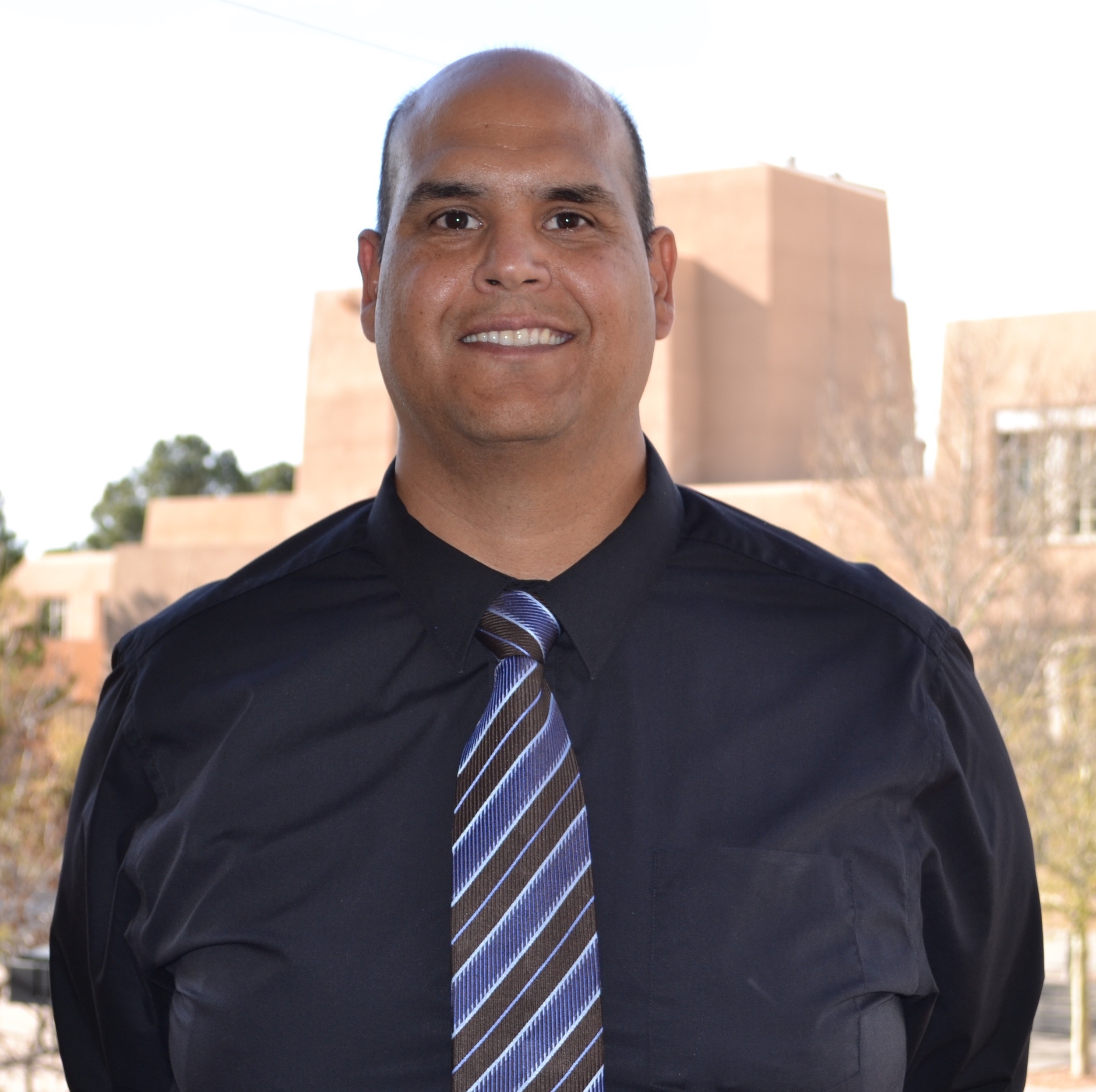
Ricardo

Hometown:
Albuquerque & Tierra Amarilla, NM
Title:Director, McNair Scholars & Research Opportunity Programs
Campus:UNM Main Albuquerque
- Degree(s):
B.A. & M.A. in History
- Institution:
UNM and Wisconsin-Madison
- First Gen Story
My path to earning a bachelor's degree was very unorthodox, but if I can do it, you can too! I am the youngest of 5 kids and I was the first to earn a college degree in my family. Here are some highlights:
• Half my childhood was spent in Albuquerque and the other half was in Tierra Amarilla (TA). I started high school at Escalante High and graduated from Albuquerque High.
• Our parents encouraged us to graduate from high school so we could get a job with the city or state and have a steady income with benefits. They didn’t emphasize education in general or higher ed. at all.
• My high school counselor didn’t encourage me to go to college. When I told him I heard about an auto mechanics trade school he said that sounded like a good idea.
• I went to trade school and worked as a forklift mechanic for 7-8 yrs. after high school.
• A distant cousin moved to Albuquerque during that time and encouraged me to go to college but I honestly didn’t know where to start.
• I eventually took my first two college classes at night at CNM while working full time.
• I was hooked! I transferred to UNM after 4 semesters at CNM.
• In my first semester at UNM a history professor, Dr. Slaughter, told me that she expected me to do great at UNM and go on to graduate school. I honestly didn’t know what graduate school was at the time, but her encouragement meant the world to me.
• At UNM I participated in the McNair Scholars Program and it changed my life! McNair prepares, first-generation, low-income, and/or underrepresented students for graduate school.
• Because of McNair (and hard work), I was accepted at 5 graduate schools in my senior year and I was offered funding at all of them. 4 of my options were fully funded!
• I chose the Ph.D. History Program at the University of Wisconsin-Madison where I was guaranteed 5 full years of funding including 2 full years of fellowships.
• Although, I highly respect anyone who works a blue-collar job, I am living proof that a college degree opens doors that I didn’t think were possible.
• In a few short years, I went from working in a garage/mobile repair to sitting in a seminar room with some of the world’s top experts in the field of history, literally!
• When I entered college, I had barely traveled outside of New Mexico. Since, I have lived in a couple foreign countries and learned another language.
• While in graduate school I worked for two TRIO programs, SSS & McNair and I fell in love with their mission of serving first-generation, low-income, students. I ended up pursuing that career field after earning my master’s degree at UW-Madison.
• My first job after grad school was at UNM’s College Enrichment Program (CEP) and then I transitioned to McNair after 8 years. I am passionate about working with first-generation, low-income, and underrepresented students!
- What advice would you give to fellow first-gen students?
#1. Graduating from college is a team sport! So reach out for help when you need it. There is no need to figure out things on your own when there are so many programs and people here that are paid to help you find your way. Do you think that a billionaire’s kids hesitate to get help from their parents or associates?
#2) I really struggled connecting with my family and blue-collar friends while I was in college. Although I worked hard as a mechanic and got my hands dirty, I found college to be much more laborious in a different way. I sometimes missed family events, etc. because I had to study and I also saw the world differently because of my classes. My family and friends outside of school weren’t very accepting of how much time it takes to do well in school mainly because they never experienced college life. To be honest, I don’t have a magic solution for overcoming this issue. However, you will eventually strengthen those connections with time. So be patient and hopeful.
#3) I earned two degrees with no debt whatsoever by applying for scholarships, fellowships, etc. and managing my finances well. Applying for scholarships takes time and effort but the payoff is much better than most jobs you can get. Imagine it takes you 10-20 hours of work to complete a scholarship and you are awarded $2,000. That is the equivalent of getting paid $100 - $200 an hour!
Zerrick 🐺

Hometown:
Albuquerque, New Mexico
Major(s):Business Administration
Year in School:Junior
- Why did you choose UNM?
I chose UNM because I have had several family members who attended the university, it was affordable, and I knew UNM had a strong business program. I love Albuquerque and am happy to be able to complete my undergrad here.
- What has been your best UNM experience?
My best UNM experience has been my first summer as an New Student Orientation Leader. I loved getting to learn more about the university, connect with other leaders, professional staff, and new students, as well as getting the opportunity to help ease students into this new chapter in life and get them excited about going to UNM!
- What advice can you offer new students?
Take advantage of every opportunity that comes your way. Step out of your comfort zone and attend student org meetings, talk to new people in your classes, apply for every job and internship that interests you. Enjoy every second of your undergrad and do what you can to get involved. It'll go by faster than you think!
Designed by Sophia Saavedra
